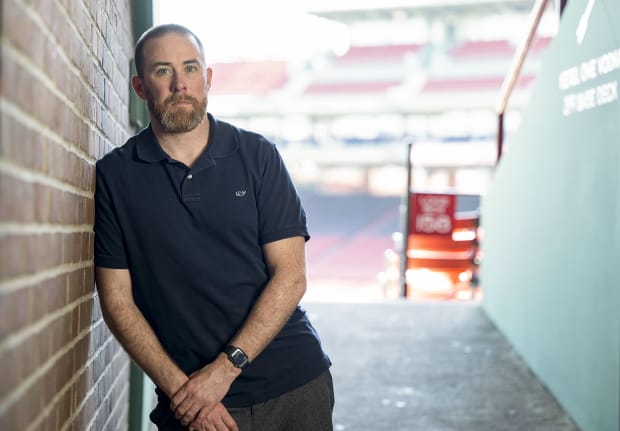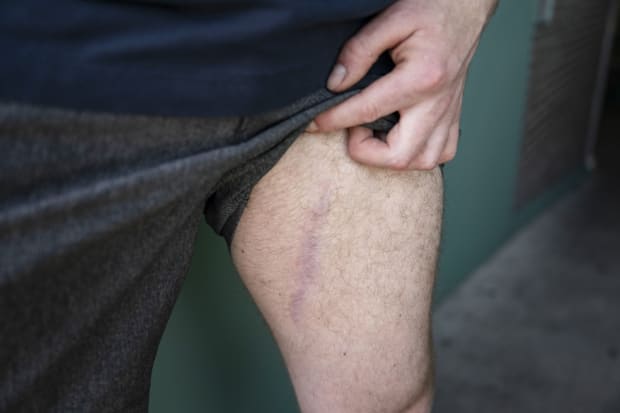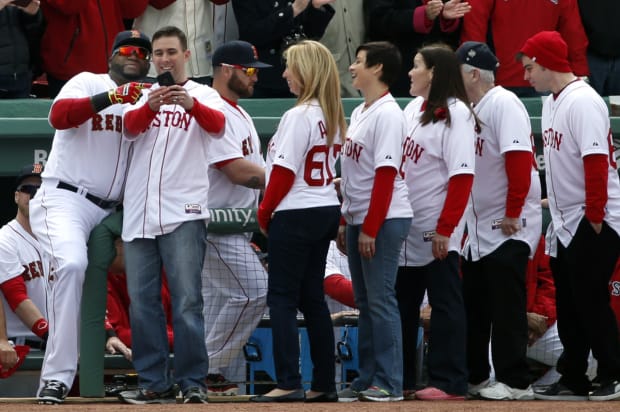Ten years ago, Dic Donohue became what is rare in America today: a universally beloved cop.
April 2013. The nation’s eyes were on Boston, and eyes in Boston were darting around, looking for murderers. A bomb had exploded at the Boston Marathon finish line, killing 29-year-old Krystle Campbell, 23-year-old Lingzi Lu and 8-year-old Martin Richard, and injuring over 250 more. Two suspects had been named but not apprehended. The city shut down while law enforcement searched for them.
Donohue was patrolling on a 12-hour shift in a single-officer cruiser, believing he had “lucked out” because he was driving instead of on his feet for 12 hours. He was looking for any sign of anything that might lead to something when he got the call about Sean.

Billie Weiss/Sports Illustrated
They had gone to police academy together, literally: Five days a week, Dic and Sean Collier would leave their Somerville homes before dawn, hop in a car together, pick up coffee at a Dunkin’ Donuts in Medford, and then drive down to Quincy for training. If they got home early enough, they would listen to music and drink beers on a porch. Sean was at Dic’s wedding. Sean was a guy he pranked. Sean became an MIT cop. Sean was dead.
Three days after the bombings, Sean was sitting in his police car when the marathon suspects shot him. Dic called friends and academy classmates to tell them, but he did not go home. The suspects were still roaming, and Dic was still on duty. “There’s no way to describe it,” he says of his grief, “but at the same point, I’m a police officer.” Another cop joined him in a cruiser, and when police began a shootout with the suspects in Watertown, Dic and the other cop drove down there, and that is when the bullet hit Dic in the femoral artery of his right leg.
He was in cardiac arrest when he got to the hospital. He says doctors pumped his chest for “40-something minutes,” and one doctor climbed on top of him and put a knee on his groin to stop the bleeding, saving his life because that’s what doctors do.
The city was grateful and let Dic know it. He threw the first pitch at Fenway Park and met President Obama at the White House. He received enough awards and commendations to fill a big display case. He put them in his basement instead. He says “people did much more heroic things than I did.” He felt he was being honored more for the price he paid than the work he did.
He needed two years to go from hospital bed to wheelchair to cane to walking into a police department just so he could be a working cop again. On his first day back, he entered quickly and went straight to an office so nobody could applaud him for going to work.
He soon realized he was fooling himself. He had the mind of a cop but the body of a shooting victim. He can’t run for very long. He slips down stairs. He has permanent pain in his left leg, which isn’t even the one that got shot. Nine months after going back, he “retired.”
Ten years have passed since Donohue was hailed as a hero cop. He eventually made his peace with the awards. They sit in his home office now. But he says these days, when he is in an airport bar and somebody asks him about his work, “I’d rather avoid it. Put me in a random situation talking to a stranger; I’m not going to bring it up.”
He can explain why with a series of names and places that tell their own tragic stories and blend to tell a larger one. Tamir Rice. Ferguson, Missouri. Ahmaud Arbery. George Floyd and Derek Chauvin.
Donohue understands the outrage. It is now his job to understand. After leaving the force, he earned a Ph.D in criminal justice and criminology and became the director of the Center for Quality Policing for the RAND Corporation. He spends his days studying the divide between America’s cops and its citizens—and how to bridge it.

Billie Weiss/Sports Illustrated
The education of Dic Donohue began long before anybody heard of Dzhokhar and Tamerlan Tsarnaev, the brothers who planted the bombs. Six months in the academy taught him what cops should do, both practically and ethically: how to conduct a traffic stop, for example, and when it is justified. One of his first partners was an older officer who showed him that nabbing criminals was a byproduct of the profession, not the purpose of it. Their job was to help people.
“He knew everybody,” Donohue says. “He knew the neighborhood. It took a lot for him to make an arrest.”
As a booking officer, Donohue was called a racist: “Nobody says ‘Thank you for arresting me.’ I’m like, ‘Look, I’m just doing my job.’ I would try to de-escalate the situation.” He had a harder time when one accused criminal called his partner, a Cape Verdean woman, the n-word. If he were on the street and not a cop, he probably would have punched the man, but says in the booking room, “I’m on camera. It’s not really ethical and probably not constitutional to punch somebody” ... and yes, the probably was sarcastic.
He saved the life of a man whose throat was slit, and the fact that the man turned out to be a criminal did not diminish the nobleness of the deed. He also saw cops inflate the hours they worked, leave their details before the ends of their shifts and struggle with alcohol addiction. He worked in the Massachusetts Bay Transportation Police department with men and women, people of Asian and Caribbean descent, a gay supervisor and military veterans and people who had worked in restaurants. He learned that police departments, like legislative bodies or journalism outlets, are most effective when they reflect the communities they serve.
He now harbors beliefs that would seem eminently reasonable in a less heated country. He is proud he was a cop but is not proud of all cops. He says, “There should be some behaviors that we can all call out, whether it be by the public or by the police. Things like racial profiling. I mean, that should be a slam dunk in 2023.” He says, “If you shoot somebody, completely justified, you then have to render aid to them.” He understands why there are cameras everywhere but worries about unintended consequences. If a cop sees kids drinking beers in a park, and he tells them to throw the cans away and go home, how would that look on video?
He sees people get arrested for drugs, serve time, then get out and use again, and he wonders what purpose that serves: “We’re certainly a very carceral country. A lot of people are involved in the criminal justice system, and maybe they don’t need to be. And I think that’s where some of the social services can defuse and deflect some of the problems.”
He watched the George Floyd video and says, “‘You see this, you’re like, ‘It’s a complete moral failure. It’s a crime, obviously. Tactically, it’s a mess, too. What the hell is going on here?”
He says: “If you ask me, when I think of policing—when I was a cop or now—the bottom line is, things can be done better. Everything can be done better. You can’t just sit back and do the same thing and wonder, ‘Hey, why are we failing again?’”
How did we get here? Donohue has theories but not answers. He says, “You look back at history, and there’s been breakdowns of racial relations where the police are often involved.” That bred mistrust. Overuse of force and violations of rights created fear. People should see police as part of the community, but today, even cops performing mundane tasks often look like soldiers: full uniform, bulletproof vests, semiautomatic weapons. It creates an expectation of confrontation (especially, he points out, for anybody who emigrated from a country run by the military).
There are so many police departments with such varied track records, some with deeply embedded systemic issues, that one solution does not exist. But Donohue has studied policing enough to form a set of principles. When the law allows discretion, the ideal use of discretion is to de-escalate. A primary quality of an officer, he says, should be empathy. He says, “You don’t need to rush through things and force an arrest when it’s not needed. We get paid by the hour. We can take our time. Slow down.”
Police and communities are both susceptible toward an “us versus them” mentality that helps neither. Citizens should not assume cops have bad intentions, and cops should not assume anybody is guilty. Departments can do a better job of being proactive, monitoring behaviors that could lead to brutality before they do.
“If you find that there’s a white officer that’s disproportionately stopping black people, you might want to dig deeper, right?” Donohue says. “I’m not gonna say, ‘You gotta fire that guy.’ Those may all be legitimate stops. But they might not.”
Last year, Donohue co-authored a study on policing in Charlotte. The results and recommendations were complex—some deficiencies, some inconclusive data, much of it nuanced. As Donohue prepared to brief the predominantly Democratic Charlotte city council, he was ready for blowback.
“I thought it was gonna go one way, and it actually went very well,” he says. “There was a bit more agreement than I expected. It was eye-opening. At the end of the day, we’re human beings, and we want people to be treated fairly.”

Elise Amendola/AP
Ten years have passed since the Boston Marathon bombing. Donohue still has a bullet between his thigh and buttock, which he says is “a good party trick—you can move it around,” and he still doesn’t know who fired it. It could have been a Tsarnaev or it could have been a cop. Nobody choreographs a firefight.
“It doesn’t matter to me,” he says. “If it came from an officer who’s trying to stop a threat from a terrorist, what am I going to do?”
In those early days in the hospital, before he got the hero’s celebration that he didn’t want, Donohue had lost so much blood and was on so much pain-killing medication that he yelled at his wife, Kim, to have their baby already. She wasn’t pregnant. Their first son, Richie, had been born six months earlier. Dic had suffered memory loss. He still doesn’t remember the boy’s first Christmas.
Ten years. Calendars track time but not change. Richie has two younger brothers now, named Connor and Finn. One of the areas their dad used to patrol, Dudley Square, is now Nubian Square; it was renamed in 2019 because Thomas Dudley was a prominent politician in the 1600s, when Massachusetts became the first colony to legally sanction slavery. Kim plans to run the Boston Marathon next week.
Dic likes his job. But he would have preferred to be a working cop, trying to keep people safe, the way he was in April 2013. The way Sean was, too.
No, Donohue does not tell strangers these days that he was a cop. But sometimes he tells cops about strangers. As he finishes presentations to officers, he shows them CNN video after one bomber was killed and police arrested the other, of Bostonians banging on police cars and cheering for law enforcement, and Donohue says, “Ladies and gentlemen, these people didn’t disappear.” Donohue has seen what good policing can do and how good people appreciate it, and he has hope.







